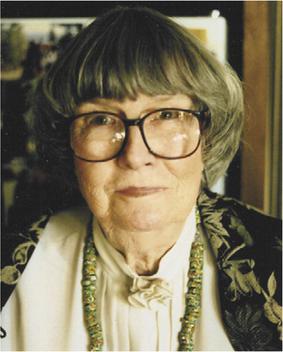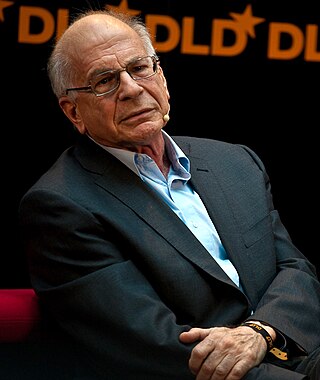
Persuasion or persuasion arts is an umbrella term for influence. Persuasion can influence a person's beliefs, attitudes, intentions, motivations, or behaviours.

Margaret Thaler Singer was an American clinical psychologist and researcher with her colleague Lyman Wynne on family communication. She was a prominent figure in the study of undue influence in social and religious contexts, and a proponent of the brainwashing theory of new religious movements.

Daniel Kahneman is an Israeli-American psychologist and economist notable for his work on the psychology of judgment and decision-making, as well as behavioral economics, for which he was awarded the 2002 Nobel Memorial Prize in Economic Sciences. His empirical findings challenge the assumption of human rationality prevailing in modern economic theory.

Behavioral economics studies the effects of psychological, cognitive, emotional, cultural and social factors on the decisions of individuals or institutions, such as how those decisions vary from those implied by classical economic theory.
In psychology and behavioral economics, the endowment effect is the finding that people are more likely to retain an object they own than acquire that same object when they do not own it. The endowment theory can be defined as "an application of prospect theory positing that loss aversion associated with ownership explains observed exchange asymmetries."

Richard H. Thaler is an American economist and the Charles R. Walgreen Distinguished Service Professor of Behavioral Science and Economics at the University of Chicago Booth School of Business. In 2015, Thaler was president of the American Economic Association.

Mental accounting attempts to describe the process whereby people code, categorize and evaluate economic outcomes. The concept was first named by Richard Thaler. Mental accounting deals with the budgeting and categorization of expenditures. People budget money into mental accounts for expenses or expense categories. Mental accounts are believed to act as a self-control strategy. People are presumed to make mental accounts as a way to manage and keep track of their spending and resources. People also are assumed to make mental accounts to facilitate savings for larger purposes. Like many other cognitive processes, it can prompt biases and systematic departures from rational, value-maximizing behavior, and its implications are quite robust. Understanding the flaws and inefficiencies of mental accounting is essential to making good decisions and reducing human error.
Celia Elizabeth (Betsy) Hoffman was Executive Vice President and Provost of Iowa State University from 2007-2012, where she remains as professor of economics. From 2000 to 2005, she was President of the University of Colorado System, where she is President Emerita. She is also a Senior Distinguished Fellow at the Searle Center on Law, Regulations, and Economic Growth at Northwestern University School of Law, and serves on numerous for-profit and non-profit Boards. She served on the National Science Board from 2002-2008. Her published research is in the areas of Experimental economics, Cliometrics, and Behavioral Economics.
Christine Jolls is the Gordon Bradford Tweedy Professor of Law and Organization at Yale Law School, where she has been since 2006. She is known for her work in the emerging theory of behavioral economics and law. Her areas of research include employment law and contracts. She received her B.A. in economics from Stanford University, a Ph.D. in economics from the Massachusetts Institute of Technology and her J.D. from Harvard Law School. She was a law clerk to Supreme Court Justice Antonin Scalia and taught at Harvard Law School. She collaborates with Professor Cass Sunstein of Harvard Law School.

Customer experience (CX) is a totality of cognitive, affective, sensory, and behavioral consumer responses during all stages of the consumption process including pre-purchase, consumption, and post-purchase stages. Nihat Tavşan and Can Erdem bring an extensive elucidation to the customer experience, encompassing the dimensions of consciousness, subjectivity, and interactional nature and define customer experience as the sum of subjective ideas regarding a product or service that occur at a conscious or subconscious level due to direct or indirect interaction of a customer with brand-related stimuli. Pine and Gilmore described the experience economy as the next level after commodities, goods, and services with memorable events as the final business product. Four realms of experience include esthetic, escapist, entertainment, and educational components. Tavşan and Erdem divided the customer experience into four categories based on the levels of cognitive and physical involvement of customers. These four categories are euphoric experiences, captive experiences, mellowing experiences, and conductive experiences.
Itamar Simonson is a professor of marketing, holding the Sebastian S. Kresge Chair of Marketing in the Graduate School of Business, Stanford University. He is known for his work on the factors that determine the choices that buyers make. His academic career started at the University of California at Berkeley, where he taught for six years, before he moved to Stanford. Many of his former PhD students hold senior positions at some of the best universities in the world.

Peter McGraw is an American professor of marketing and psychology at the University of Colorado Boulder. As a behavioral scientist his research spans the fields of judgment and decision making, emotion, affect, mood, and behavioral economics.

Jennifer Aaker is an American behavioural scientist and General Atlantic Professor and Coulter Family Fellow at the Stanford Graduate School of Business. She is known for her research on time, money, and happiness. Aaker also focuses on the transmission of ideas through social networks, the power of story in decision making, and how to build global brands across cultures. She is the recipient of the Distinguished Scientific Achievement Award from the Society for Consumer Psychology and the Stanford Distinguished Teaching Award.

Ziv Carmon is the Dean of Research, Professor of Business Administration, and holder of The Alfred H. Heineken Chaired Professorship at INSEAD. An expert in human judgment and decision-making, he is best known for his research on placebo effects of commercial actions and on the endowment effect, and his presentations and teachings about Customer Insight.
William Frederic (Bill) Boulding is an American economist, professor and academic administrator. He is the dean of the Fuqua School of Business at Duke University.
David Gal is Professor of Marketing at the University of Illinois at Chicago. He is best known for his critiques of behavioral economics, and in particular his critique of the behavioral economics concept of loss aversion. His forthcoming book is titled The Power of the Status Quo.
Kathryn LaTour is an American academic, researcher and author. She is an applied cognitive psychologist and currently serves as the Banfi Vintners Professor of Wine Education and Management at the School of Hotel Administration within Cornell University’s SC Johnson College of Business.
Cassie Mogilner Holmes is a professor of marketing and behavioral decision making at UCLA Anderson School of Management and author of Happier Hour. Best known for her research on time and happiness..
Kelly Goldsmith is an American marketing researcher who specializes in consumer behavior and a former reality television contestant. She is currently the E. Bronson Ingram Chair and Professor of marketing at the Owen Graduate School of Management at Vanderbilt University.
Sarah Louise Zechman is the Tisone Memorial Fellow Professor at the Leeds School of Business, University of Colorado Boulder.









